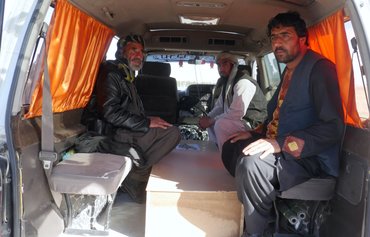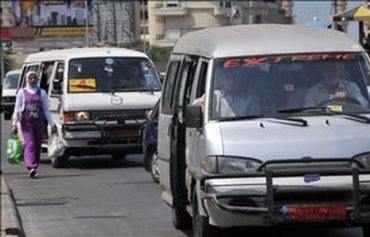Overwhelming economic pressure and sky-high inflation have forced some Iranians to resort to desperate measures in order to survive -- including selling their organs.
In the past, impoverished people forced to choose this extreme and unusual route to make ends meet generally did so in secret, ISNA reported last month.
But people are now doing so openly, even pasting announcements with contact information on walls in streets and alleyways, especially near hospitals.
According to Tejarat News, an Iranian daily, the poor have two main motives to sell their organs: paying hospital expenses, or having enough money in the bank to prevent returned cheques.
![A picture taken on February 3, 2014, shows low-income Iranians lining up to receive food supplies in Tehran. [Gavour Ghahrdar/ISNA/AFP]](/cnmi_am/images/2022/03/18/34590-iran-poverty-600_384.jpg)
A picture taken on February 3, 2014, shows low-income Iranians lining up to receive food supplies in Tehran. [Gavour Ghahrdar/ISNA/AFP]
Among those who try to sell their organs, some say they are unemployed, and others say they are employed but that their income is so low that it does not cover their living expenses, the outlet said.
Official data show the minimum wage increased by about 39% in 2021, but the point-to-point inflation rate was cited as being close to 50%, erasing any gain.
Yet, despite the economic hardships in Iran, its leaders have chosen to spend their dwindling supply of cash on conventional weapons –- including rockets and mortars -- that they share with proxy militias in the region.
Young, desperate, unemployed
Most Iranians who place advertisements for organ sales include their age on the announcement, and they are generally young (between 19 and 30).
Some advertisements make direct reference to the economic situation in Iran, indicating that they see no other solution but to sell their organs.
"I am 19 years old, and I have a kidney for sale because of economic pressure," reads one advertisement seen near a hospital in Tehran.
Others seen on city walls read: "25-year old male has a kidney for sale" and "Kidney for sale: 21-year old male with a healthy, athletic body".
Some advertisements are circulated on social media.
"Because of the high demand for organ transplants and the low supply, this need has turned into a business on the black market," said journalist Vida Rezaei, who covers social issues inside Iran.
The value of body parts varies because sellers and buyers set their own price, Rezaei said. It may be anywhere between 150 million IRR ($3,529) and 500 million IRR ($11,764) for a kidney.
Livers and corneas are sold at 150 million IRR and higher.
In recent weeks, the high demand for organs in Iran has seen some Afghan refugees accusing the Iranian military of harvesting their organs.
A recent report issued by the Majles Research Centre, which provides Iran's legislators with policy reports, presents a bigger picture of the economic crisis that is forcing some Iranians to sell their organs.
In Iran, the report states, an average 60% of employees work in the "unofficial sector" -- meaning they lack health insurance, benefits or any kind of welfare pension for retirement.
Unemployment is another major factor. According to official statistics, the number of employed workers in summer 2020 was 1.2 million less than the same period in 2019.
Meanwhile, rising inflation has increased household spending. Households across the country have spent 41.4% more on necessary items in October 2021 than in October 2020.
Neither legal nor illegal
According to economist Mehdi Feizi, the sale of organs takes place illegally in other countries around the world, Eqtesad Online reported.
"As far as I know, Iran is the only country where buying and selling kidneys are legal," he said.
In Iran, Feizi said, the concept of "legal" means there is no existing law that forbids it. As organs are not listed as a commodity prohibited from being traded, the sale of organs "is not considered illegal", he explained.
According to Rezaei the journalist, non-governmental organisations (NGOs) and private charities, as well as some media outlets, have tried for years to spread the culture of organ donation.
An effective donor programme would increase the overall availability of organs and would make it less likely that patients in dire need of organ transplants would turn to the black market.
But the government has instead created obstacles for NGO activities, he said.
Meanwhile economic mismanagement and a regime that prioritises foreign expansionist plans over the well-being of its own citizens -- which are dragging a wealthy country like Iran into poverty -- leave no option for those in dire need but to sell their organs, Rezaei said.

![Taken in January, this picture shows advertisements for 'urgent' organ sales posted on a street in Iran, along with details of the blood type and age of the seller. [Tejarat News]](/cnmi_am/images/2022/03/18/34190-Iran-organ-sales-600_384.jpg)





